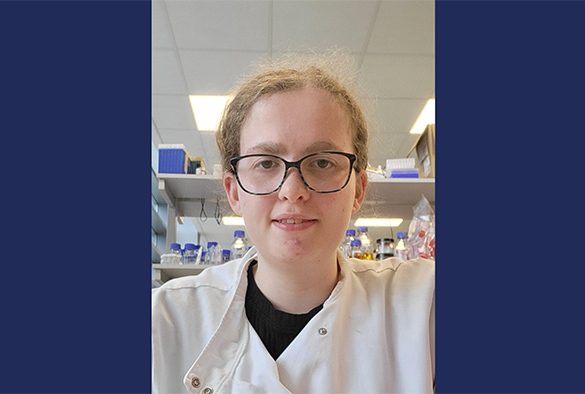
Ruby Darwin is a PhD student in the Department of Infection Biology and Microbiomes. She recently attended the 8th World Congress on Targeting Phage Therapy and told us about the event.
My research
I am a microbiology PhD student in Dr Mal Horsburgh's lab within the Biosciences building under the supervision of Vanessa Schmidt, a Senior Dermatology Veterinarian.
My research focuses on how different types of bacteria interact on a dog’s skin. In particular, I’m investigating whether certain naturally occurring (commensal) or allergy-associated (atopic) bacteria can inhibit Staphylococcus pseudintermedius, a common bacterium that can cause skin infections in dogs.
Using lab techniques such as bacterial growth tests and DNA extractions and analysis, I aim to find out which bacteria can inhibit harmful strains, and to understand how they do it. The long-term goal is to help develop alternative treatments to antibiotics.
Targeting Phage Therapy 2025
Thanks to the IVES small grant funds, I was able to attend the Targeting Phage Therapy conference 2025 virtually. This two-day event featured speakers from around the world presenting their research on phages and their potential uses.
Phages are viruses that infect and kill bacteria, and they’re being explored as an alternative to antibiotics in treating bacterial infections. The session on ‘Application of Phages within Veterinary Medicine’ was of particular interest to me as there was a talk about the first clinical trial of phages in Japan for treating otitis externa, an outer ear infection, caused by Pseudomonas aeruginosa.
In the talk, researchers explained how the phages were applied after cleaning the ear, and how they monitored both the presence of P. aeruginosa and the sensitivity of the phages over time. The trial showed that P. aeruginosa decreased but was still present within the ear, less than 1%. The trial indicated that diversity within phages is necessary as resistance can quickly develop.
Although I initially attended the conference to focus on veterinary applications of phage therapy, I found several other talks equally interesting. These included the clinical trials of DUOFAG, a spray containing phages to treat skin infections and wounds, the usage of freeze-dried phage tablets, the use of phages against quorum sensing genes (as quorum sensing can impact the virulence of a bacteria) and how phages can co-evolve with the bacteria they are targeted to treat.
These talks were interesting in furthering my knowledge on how phages work but also highlighted potential applications of phages which could be relevant within my project, particularly if we find phages that can combat Staphylococcus pseudintermedius.